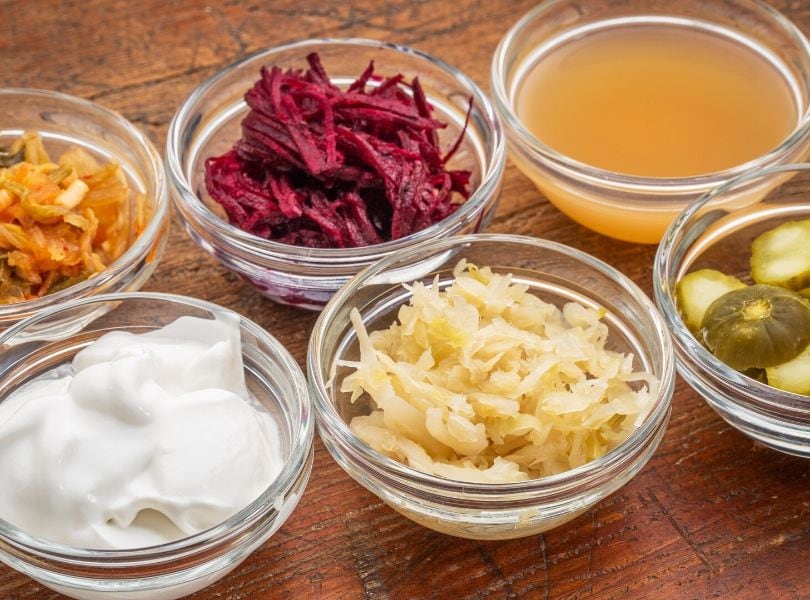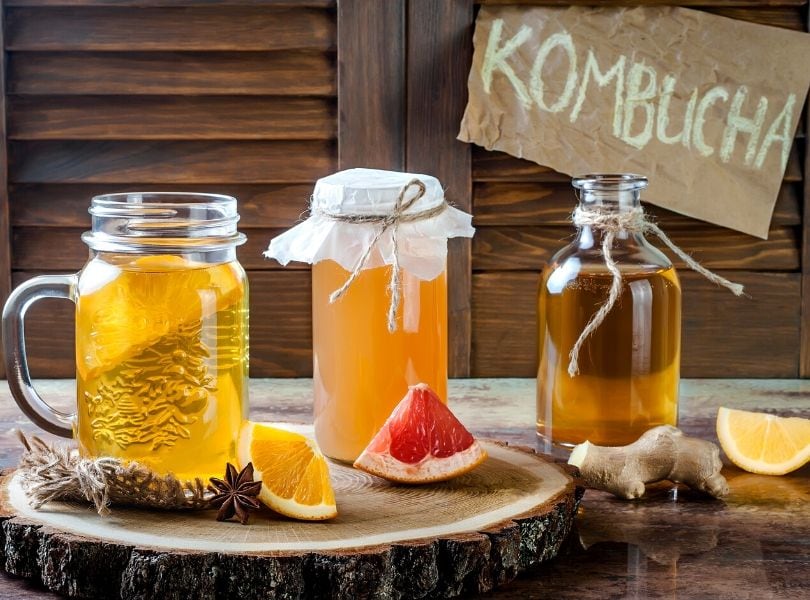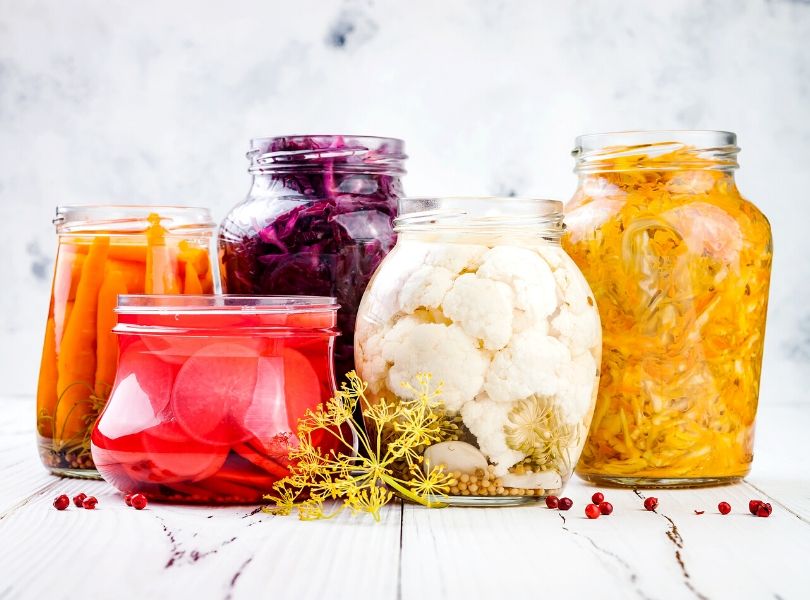Congratulations if you are reading this because you are pregnant!
It is an exciting time yet also a confusing time with regards to what you should and shouldn’t eat and drink!
In this blog, we explain the benefits of maintaining a healthy gut and vaginal flora for you and your baby and how to do this in a practical way.
What is ‘flora’ and why is it important
Within our mouth, digestive tract and vagina we have a diverse range of bacterial species residing. They help to maintain a healthy balance against an overgrowth of bad bacteria or yeasts.
During a natural birth, the baby ‘picks up’ the mother’s bacteria as he/she travels through the birth canal. The bacteria enter the baby’s mouth and nasal cavity ‘populating’ these areas and eventually
populating the gut also.
As 70-80% of our immune system resides within the gut, this process of ‘seeding’ helps to prime the baby’s immune system. However, this is assuming Mum has a healthy balanced environment in the first place.
Ensuring healthy ‘seeding’ for the baby supports their general health and well being as they grow.
Studies have linked healthy gut microbes in children to a reduced risk of atopic allergies. Babies and children with healthy gut microbes are also less likely to suffer ear, throat and chest infections in childhood. Who wouldn’t want this for their children!
How do you know If you have a healthy balance of vaginal flora?
A common symptom during pregnancy is thrush. It can present as redness and itchiness in and around the vagina and/or vulva, there may also be a strong-smelling discharge. This can indicate an overgrowth of yeast in your vaginal flora.
It is best to rectify this before the birth of your baby to prevent your baby from picking up non-beneficial yeasts during birthing.
Typically, in babies, thrush can manifest in the mouth, as a coated white tongue, or also a fungal infection around the vulva.
If you suspect you or your baby have thrush it is very important to speak to your doctor or nurse about it. It can be very easily treated with creams, or in more severe cases in adults, by pessary.
Probiotic supplementation can also play an important role, speak to your local pharmacist about recommending a suitable product.
How to Prime your Flora in Preparation
It is particularly important in the third trimester to ensure your flora is well balanced!
Healthy gut flora will support healthy bowel movements – which you will certainly be grateful for post-pregnancy. As mentioned above, a healthy vaginal flora will provide baby with what (s)he needs to
give them the best start in life.
There are many ways you can ensure that you have well balanced vaginal and gut flora in preparation for your baby’s journey:
-
Minimise Sugary Foods That Feed the Non-Beneficial Gut Microbes
In the last trimester, you can be feeling particularly heavy and low in energy. As a result, it is tempting to reach for sugary snacks as a ‘pick me up’ or refined foods that are easier and quicker to cook.
However, they are not promoting a healthy flora. In fact, they are feeding the non-beneficial microbes.Aim for more nutritious snacks such as live yoghurt and berries. Switch fizzy drinks for sparkling water with a splash of apple juice. Go for fibre-rich grains such as brown rice, brown pasta, wholegrain couscous or quinoa. If you are finding they take too long to cook, soak them overnight or throughout the day, to speed up the cooking process. Don’t be afraid to use frozen vegetables and when you have a bit of energy try batch cooking or making some wholesome flapjacks/oat bars. If you need a sweet hit, aim for 70-85% dark chocolate, try melting it and dipping in strawberries!
-
Eat a rainbow
A diet high in colourful vegetables and a small amount of fruit will ensure a healthy environment for the beneficial microbes to flourish. The recommendation is SEVEN portions of fruit and veg per day, if you can reach TEN that would be even better! Limit fruit to two portions per day and aim for at least FIVE portions of different brightly coloured vegetables. If you find it difficult to reach this, try to include vegetables in a smoothie for breakfast or a snack. If you are having eggs for breakfast add in a handful of spinach and some cherry tomatoes. As a snack, chop some carrot and red pepper into batons and have with some hummus or pesto. Soups, stews and salads are also a great way to pack in lots of vegs. This will also provide plenty of fibre for keeping bowel movements regular.
-
Introduce Fermented foods
Historically our ancestors fermented foods to maintain the freshness of common products such as milk, grains and vegetables. Fermentation involves adding live bacteria to the food to prolong their shelf life. Many of our favourite foods and drinks are fermented including some cheeses, yoghurt, wine, beer. Fermented foods are a fantastic and practical way of getting a daily dose of healthy microbes into your body. They are a wonderful addition to your diet, not just in pregnancy, but long term. Here are some practical ways to start introducing them:

Live natural yoghurt
Yoghurt is one of the most widely fermented foods and has been consumed for thousands of years all around the world. When choosing yoghurt it must say ‘live’ or ‘bio’ to ensure the bacteria has not already been pasteurised and killed off.
Aim to choose natural yoghurt as opposed to fruit yoghurts which tend to be high in sugar. You can add your own fruit and drizzle some maple syrup over it if you still need some extra sweetness.
Kefir
Kefir is fermented milk that tastes quite like a yoghurt drink. You can usually get kefir grains handed down to you by someone else who uses them. By adding kefir grains to full-fat milk, within 2-3 days you will have a yoghurt type consistency product that is rich in a variety of healthy bacteria, as well as being high in protein and calcium. If making it yourself, particularly during pregnancy always use pasteurised milk to reduce the risk of consuming harmful bacteria. You can drink it as is, flavour it with your own toppings or add it to smoothies.
Sauerkraut / Kimchi
Traditionally, pickled vegetables have been popular in certain cultures for thousands of years. It is very easy to buy white or red cabbage and ferment it to make sauerkraut yourself.
You can also buy it for convenience, but make sure it is ‘raw’ or ‘unpasteurised’ and kept in the fridge to ensure the bacteria are still live.
Sauerkraut and kimchi (mix of pickled vegetables with added spices) boast a wide range of bacteria that are healthful for the gut. Start with small amounts serving a forkful with any dish as an accompaniment or mixing it through a salad.

Fermented miso paste
Popular in Chinese and Japanese culture for two and a half thousand years, miso is fermented from soybeans, barley or brown rice using ‘koji’, a fungus. Miso paste can be added to soups and stews once you have taken them off the heat. They add a lovely salty flavour to food.
It can also be enjoyed as a warm drink, but do not add to boiling water.
Tempeh
Tempeh is similar to tofu however it is fermented using soybeans and a starter culture which is a mix of live mould. It is especially beneficial for vegans as it also provides a rich source of protein.
It can be added into stir-fries where is will soak up the flavours of the dish.
**Remember, with all fermented products it is recommended NOT to heat them, as this will kill off
the beneficial microbes.
Cautionary Note
Kombucha during Pregnancy
Kombucha is a drink made from a mushroom called a ‘scoby’ (a flat round culture of bacteria and yeast). It uses black tea and sugar to produce the fermented drink. It can also be made using rooibos
tea to make it caffeine-free.
The end product contains a wide variety of live bacteria but there can also be a small amount of alcohol therefore it is controversial to consume it in pregnancy.
There is little research to determine whether or not it can be recommended in pregnancy therefore it is best to air on the side of caution and focus on the other examples given. Fermented milk and vegetables typically will not have any alcohol.

Kvass during Pregnancy
Kvass is a fermented beverage traditionally made in Russia. It is fermented from rye or dried rye bread.
Usually, kvass contains less than 1.5% of alcohol by volume, however overtime when left standing this can reach 2.5% or even higher.
Like with kombucha and particularly if homemade it is very difficult to quantify how much the alcohol content is.
Due to the fact it is recommended to avoid alcohol in pregnancy, we would recommend avoiding kvass during pregnancy.
Beet kvass is also a popular fermented beverage made from beet/beetroot. A concern with fermented beet/beetroot is that it is high in betaine and nitrites, these chemicals are controversial
in pregnancy.
Betaine has been shown in studies to have side effects in animals and not enough studies have been done to confirm its safety in pregnancy. Also with regard to nitrates some women
are particularly sensitive to them in pregnancy, and again there is not enough evidence to show they if they have a toxic effect on the foetus.
Therefore, when it comes to pregnancy, we do not advise drinking kvass or beet kvass.
Also check out our posts on Rethinking Bacteria: The Benefits of Fermented Foods and Gut Health and Natural Sources of Probiotics.
If you want to learn how to ferment food yourself keep an eye on our cooking classes or if you need further one to one advice, we recommend a visit with a Health Coach or Nutritional Therapist (ntoi.ie) for a personalised tailored program.











